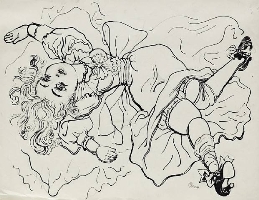The Bench Production

This play was staged at The Spring Arts and Heritage Centre (formerly Havant Arts Centre), East Street Havant - Bench Theatre's home since 1977.
WHY AN ALL-FEMALE PRODUCTION?
The practical reason is that only about 14 percent of Shakespeare's characters are female. Some of the roles are excellent for performers - Isabella in this play being one of them - but there are few of them. As a result, few women get the chance to be fully part of a Shakespeare production. Another reason is that Shakespeare himself was fascinated by gender ambivalence. Having no choice but to cast young boys in his female roles, he relished the opportunity to dress them up as girls disguised as boys being made love to by girls played by boys. In this play, the terrific seduction scene in the middle would have had a very young boy squaring up to a mature man playing Angelo. So why not turn all that on its head? Also, this is a play dominated by male attitudes to women. It reflects a society in the midst of a moral panic, obsessed with sex and its consequences, fearful of disease. And all that bad news is of course women's fault. So why not take a look at that world through female eyes?
THE PRODUCTION:
My intention is to portray an acting company (that happens to be female) staging a production of Measure for Measure. They are actors in a role first, women second. That is in fact true of any actor - you do not have to be your role in order to play it. The setting will be almost like rehearsal room - the 'set' will be made up of costume rails that can be reconfigured to make different spaces. The company will assemble on stage at the same time as the audience, as themselves, coffee in hand, mobile to ear. They will gradually take on their roles, adopting indicative bits of costume, remaining visible throughout.
Two important decisions I want to make as part of the rehearsal process itself: exactly what costume to adopt, and how far to 'disguise' as male? (But there will be no tights and no thigh slapping, definitely.)
Jacquie Penrose
Director
Cast
| Escalus | Ingrid Corrigan |
| Duke | Megan Green |
| Lucio | Sue Dawes |
| Angelo | Jane Swindells |
| Isabella | Daisy Dawes |
| Mistress Overdone | Hilary Davis |
| Pompey | Dena Hare |
| Elbow | Hilary Davis |
| Friar Peter | Dena Hare |
| Claudio | Jane Swindells |
| Mariana | Kirsty Terry |
| Juliet | Kirsty Terry |
| Francisca | Kirsty Terry |
| Officers and Servants | Sandy Constable |
Crew
| Director | Jacquie Penrose |
| Producer | David Penrose |
| Stage Manager | Maurice Lillie |
| Lighting and Sound Design | Phil Hanley |
| Lighting Operation | Simon Walton |
| Sound Operation | Mark Wakeman |
| Costumes | Judith Smyth, Di Coates, cast |
| Set Design | Jaquie Penrose |
| Programme Editor | Derek Callam |
| Photography | Julie Wood |
Reviews
The NewsJames George
A play full of magnificent language, human dilemmas, earthy humour and a whacking great problem.
That ending's a stinker.
Why does the duke remain disguised for so long, prolonging the heroine's suffering, whom he then, effectively, publicly makes a fool of? And then proposes marriage!
The play could be 10 minutes shorter if he'd only un-mask when any normal person would.
Jacquie Penrose for The Bench gives Daisy Dawes as Isabella a clear 'What-Choice-Do-I-Have?' exit - and rightly so in response to Megan Green's frankly lecherous duke.
Hang on. Megan Green as the duke?
Oh, yes. The Bench are doing what they do so well and taking risks, being creative, because Penrose has opted for an all-female cast. There's good - and clever - double-casting, too. Jane Swindells as Angelo (the baddie) and Claudio (the goodie) works very nicely.
A few of the cast feel the need to illustrate with unnecessary gesture - let Bill's language do more of the work for you - and there's a good deal of speaking to the audience rather than the other actors on stage but - you know what? I'll live with that just to celebrate the risks this company take.
Bravo.